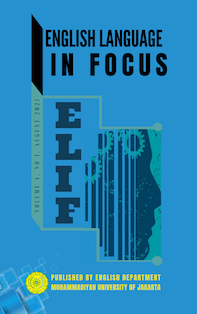EFL Students’ Coping Strategies for Speaking Anxiety During Online Learning
DOI:
https://doi.org/10.24853/elif.4.1.1-10Keywords:
Speaking, Coping strategies, Online learningAbstract
The anxiety of learning a foreign language can be an obstacle in achieving the learning goals. Concerning the learning anxiety, the students of the English Education Study Program of FKIP UHAMKA were also dealing with the anxious experience when learning speaking conducted online. It seems unavoidable for students of English Foreign Language (EFL) to face anxiety when online learning. For this reason, the purpose of this study is to investigate the coping strategies that most students use to overcome speaking anxiety during online learning. 62 students in the fourth semester were respondents to this study. The data were then qualitatively collected using two types of questionnaires: closed-ended and open-ended questionnaires. The collected data were analyzed using descriptive analysis, which described and tabulated the students’ responses. After analyzing the closed-ended and open-ended responses, it is reasonable to conclude that the respondents mostly used the strategies of preparation, positive thinking, and peer seeking to cope with speaking anxiety in the context of online learning. In addition, based on open-ended responses, preparation was the most commonly used strategy by them.References
Al-khasawneh, F. M. (2016). Investigating Foreign Language Learning Anxiety: A Case of Saudi Undergraduate EFL Learners. Journal of Language and Linguistic Studies, 12(1), 137–148. Retrieved from https://dergipark.org.tr/en/pub/jlls/issue/36116/405566
Alzamil, A. (2021). Teaching English Speaking Online versus Face-to-Face: Saudi Students’ Experience During the COVID-19 Pandemic. Arab World English Journal (AWEJ), 12(1). 19-27. https://dx.doi.org/10.24093/awej/vol12no1.2
Badrasawi, K. J., Solihu, A., & Ahmad, T. B. T. (2020). Second language speaking anxiety among Malaysian postgraduate students at a faculty of education. International Journal of Education and Literacy Studies, 8(2), 54-61. https://doi.org/10.7575/aiac.ijels.v.8n.2p.54
Cakrawati, L. M. (2017). Students'perceptions on the Use of Online Learning Platforms in EFL Classroom. ELT Tech: Journal of English Language Teaching and Technology, 1(1), 22-30. https://doi.org/10.17509/elt%20tech.v1i1.9428
Diana, L. (2021). Problems Faced In Speaking Assesment During The Covid-19 Pandemic. Study Case Of Universitas Pembangunan Nasional Veteran Jawa Timur. JISIP (Jurnal Ilmu Sosial dan Pendidikan), 5(1), 447–451. http://dx.doi.org/10.36312/jisip.v5i1.1751
Fitriani, Y., Bandung, M., & Kadri, M. K. (2020). Humanitatis Journal of Language and Literature Students’ Perspective of Online Learning on Speaking Class During Covid-19 Pandemic. Humanitatis : Journal of Language and Literature, 7(1), 1–12.
https://doi.org/10.30812/humanitatis.v7i1.946
Hadi, M. S., & Athallah, N. I. (2021). Gamification’s Effectiveness in Online English Teaching in the Pandemic Era. Jurnal Studi Guru Dan Pembelajaran, 4(2), 282-286. https://doi.org/10.30605/jsgp.4.2.2021.590
He, D. (2017). How to Cope with Foreign Language Speaking Anxiety Effectively? The Case of University Students in China. Electronic Journal of Foreign Language Teaching, 14(2), 159–174. Retrieved from https://e-flt.nus.edu.sg/
Horwitz, E. K., Horwitz, M. B., & Cope, J. (1986). Foreign Language Classroom Anxiety. The Modern Language Journal, 70(2), 125-132. https://doi.org/10.2307/327317
Kao, P. C., & Craigie, P. (2013). Coping Strategies of Taiwanese University Students as Predictors of English Language Learning Anxiety. Social Behavior and Personality, 41(3), 411–419. https://doi.org/10.2224/sbp.2013.41.3.411
Kondo, D. S., & Yang, Y.-L. (2004). Perceived effectiveness of language anxiety coping: the case of English learning students in Japan. JACET Bulletin, 42(July), 15–22. Retrieved from https://ci.nii.ac.jp/naid/110006388885/
Liu, M. (2007). Anxiety in oral English classrooms: A case study in China. Indonesian Journal of English Language Teaching, 3(1), 119–137. https://doi.org/10.25170/ijelt.v3i1.1587
Lucas, J. (1984). Communication Apprehension in the ESL Classroom: Getting Our Students to Talk. Foreign Language Annals, 17(6), 593–598. https://doi.org/10.1111/j.1944-9720.1984.tb01748.x
Mak, B. (2011). An Exploration of Speaking-In-Class Anxiety with Chinese ESL Learners. System, 39(2), 202–214. https://doi.org/10.1016/j.system.2011.04.002
Marwan, A. (2007). Investigating Students’ Foreign Language Anxiety. Malaysian Journal of ELT Research, 3(1), 37-55. http://journals.melta.org.my/index.php/majer/article/view/196/106
Nazir, M., Bashir, S., & Raja, Z. B. (2014). A Study of Second Language Speaking-Anxiety Among ESL Intermediate Pakistani Learners. International Journal of English and Education, 3(3), 216-229. Retrieved from http://www.ijee.org/
Nurfirdaus, S., & Mohd, B. (2019). Discovering The Coping Strategies of Speaking Anxiety in English Language Among ESL Learners. Foreign Language Annals, 189–195. https://ir.uitm.edu.my/id/eprint/34222
Pappamihiel, N. E. (2002). English as a Second Language Students and English Language Anxiety: Issues in the Mainstream Classroom. Research in the Teaching of English, 36(3), 327–355. https://www.jstor.org/stable/40171530
Prasetyaningrum, A., Fikni, Z., & Wati, L. (2020). English Foreign Language Students’ Strategies in Overcoming Speaking Problems. VELES Voices of English Language Education Society, 4(1), 94–103. https://doi.org/10.29408/veles.v4i1.1914
Putri, A. F., Hadi, M. S., & Izzah, L. (2021). Analysis the Influence of Online Learning on Students' Learning Enthusiasm. JETL (Journal of Education, Teaching and Learning), 6(1), 90-94. http://dx.doi.org/10.26737/jetl.v6i1.2312
Rafada, S., & Madini, A. (2017). Effective Solutions for Reducing Saudi Learners’ Speaking Anxiety in EFL classrooms. Arab World English Journal, 8(2), 308–322. https://doi.org/10.24093/awej/vol8no2.22
Rizqiya, R. S., Cahyati, S. S., Bramandika, A., & Siliwangi, I. (2021). Virtual Learning “Speaking for General Communication” During Covid-19: EFL Students’ Attitude. In National Seminar of PBI (English Language Education) (pp. 183-192). https://proceeding.unikal.ac.id/index.php/nspbi/article/view/615
Susilowati, R. (2020). The Challenges of Online Learning in Listening Class During Covid-19 Pandemic. Edukasi Lingua Sastra, 18(2), 56-72. https://doi.org/10.47637/elsa.v18i2.290
Vielhaber, M. E. (1983). Coping with Communication Anxiety: Strategies to Reduce Writing Apprehension. Business Communication Quarterly, 46(1), 22–24. https://doi.org/10.1177/108056998304600109
Yasuda, T., & Nabei, L. (2018). Effects of Coping Strategies on Language Anxiety of Japanese EFL Learners: Investigating Willingness to Communicate. Journal of Language Teaching & Research, 9(5), 905–915. https://doi.org/http://dx.doi.org/10.17507/jltr.0905.03
Downloads
Published
Issue
Section
License
Authors who publish with this journal agree to the following terms:
- Authors retain copyright and grant the journal right of first publication with the work simultaneously licensed under a Creative Commons Attribution License that allows others to share the work with an acknowledgment of the work's authorship and initial publication in this journal.
- Authors can enter into separate, additional contractual arrangements for the non-exclusive distribution of the journal's published version of the work (e.g., post it to an institutional repository or publish it in a book), with an acknowledgment of its initial publication in this journal.
- Authors are permitted and encouraged to post their work online (e.g., in institutional repositories or on their website) before and during the submission process, as it can lead to productive exchanges, as well as earlier and greater citation of published work (See The Effect of Open Access).

